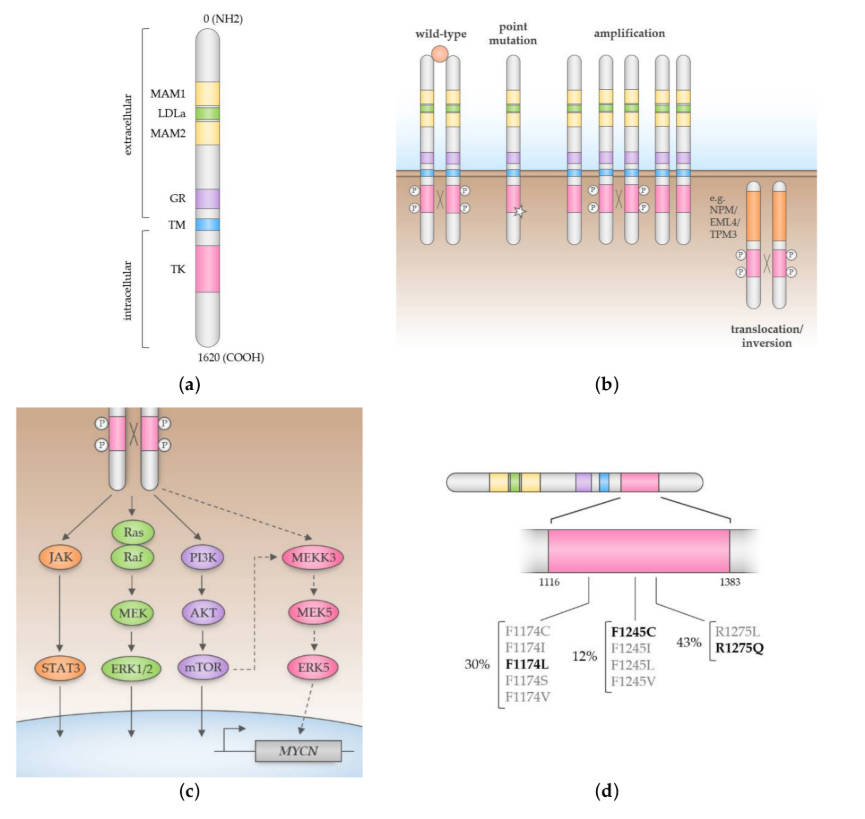With abundant experience in IVD (in vitro diagnostic) antibodies development, Creative Biolabs is able to provide a full range of ALK (anaplastic lymphoma kinase) marker-specific antibody development services for lymph and lung cancer screening and therapeutic monitoring. Our professional team is optimized to help you with high-quality and cost-effective service to make your project a success.
Anaplastic Lymphoma Kinase (ALK)
ALK is also known as ALK tyrosine kinase receptor or CD246 (cluster of differentiation 246). It is an enzyme which in humans is encoded by the ALK gene. The protein plays an important role in the development of the brain and exerts its effects on specific neurons in the nervous system. The deduced amino acid sequence shows that ALK is a novel receptor tyrosine kinase with a putative transmembrane domain and an extracellular domain. These sequences are not present in the product that transforms the NPM-ALK gene. ALK shows the greatest sequence similarity to LTK (leukocyte tyrosine kinase).
 Fig.1 Domain structure of ALK.1
Fig.1 Domain structure of ALK.1
ALK Marker of Lymph Cancer
The ALK gene can cause cancer in three ways, (a) by forming a fusion gene with any of several other genes, (b) by obtaining additional copies of the gene or (c) actual DNA-encoding mutations of the gene itself. The 2; 5 chromosomal translocation is associated with approximately 60% of degenerate large cell lymphoma (ALCL). This translocation produces a fusion gene consisting of an ALK gene and a nuclear phosphoprotein (NPM) gene: the 3' half of ALK from chromosome 2 and encoding the catalytic domain, which is fused to the 5' portion of NPM from chromosome 5. The product of the NPM-ALK fusion gene is oncogenic. In a small subset of patients with ALCL, the 3' half of ALK is fused to the 5' sequence of TPM3 gene, encoding for tropomyosin 3. In rare cases, ALK is fused with other 5' fusion partners such as TFG, ATIC, CLTC1, TPM4, MSN, ALO17, MYH9.
ALK Biomarker of Lung Cancer and ALK Testing in NSCLC
Abnormalities of ALK biology have been found in some type of human tumors for some time. However, a recent research has demonstrated that a translocation of ALK gene and EML4 was discovered in non-small cell lung cancer (NSCLC). Currently, there are no established data or other evidence to indicate any difference between the different fusion proteins reported, clinically or in therapeutic response to ALK Tyrosine kinase inhibitor (ALK TKI). Several different methods have been used to identify patients with an ALK gene rearrangement. As the product of the fusion gene exerting oncogenic activity and ALK gene rearrangements, the abnormal ALK protein may be detected by immunohistochemistry (IHC) in NSCLC (Fig 2), which are associated with modest elevations of ALK protein in tumor cells. Besides, in the vast majority of the studies, a break-apart fluorescence in situ hybridization (FISH) test (Fig 2) is often used to detect the rearrangement of ALK gene. The ALK diagnosis test to identify the NSCLC patients with abnormal ALK protein should be used in the context of the sample which was diagnosed with NSCLC and assimilated into the overall pathology report.
IVD Antibody Development Service Targeting ALK Marker
IVD antibodies have been used as essential elements in immunoassays such as immunonephelometry and sandwich ELISA to detect elevated biomarkers in various biological samples for disease screening and therapeutic monitoring. As a result, the development of antibodies with both high specificity and affinity to target molecules is of great importance. Creative Biolabs has accumulated years of experience in the antibody development with the accomplishment of various challenging projects. With our versatile IVD platform, Creative Biolabs is proud to develop novel ALK-specific antibody from scratch to commercial IVD kit (we can also start with provided antibody candidates).
If you are interested in our IVD antibodies discovery services, please contact us for more details.
Reference
- Trigg, Ricky M., and Suzanne D. Turner. "ALK in neuroblastoma: biological and therapeutic implications." Cancers 10.4 (2018): 113. Distributed under Open Access license CC BY 4.0, without modification.
For Research Use Only.